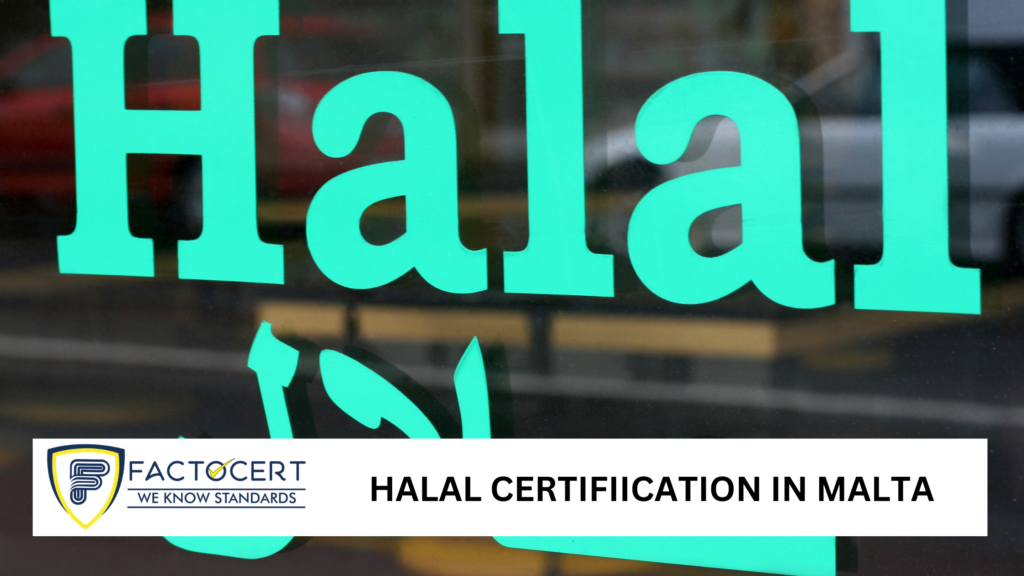Halal Certification for Malta Food Businesses
Halal certification in Malta products is rising in Malta, a nation with a growing Muslim population and a thriving food industry. Obtaining Halal certification can be a strategic move for food businesses, opening doors to new markets and consumers who prioritize products adhering to Islamic dietary guidelines. However, the path to Halal certification requires a clear understanding of the specific requirements. This blog post delves into the details of Halal certification in Malta, empowering Maltese food businesses to navigate this process effectively.
Halal certification in Malta
It’s crucial to clarify that doesn’t directly issue Halal certifications. provides a framework for management systems, including ISO 22000 for food safety management. Halal certification, however, combines the principles of an management system with the specific requirements of Halal food production. This blended approach ensures a structured and verifiable system for Halal compliance throughout the food chain.
Benefits of Halal Certification in Malta
For Maltese food businesses, obtaining Halal certification offers a multitude of benefits:
- Market Expansion: This certification opens doors to the vast Muslim consumer market, both domestically and internationally. Malta’s strategic location in the Mediterranean is a potential gateway to Halal food exports.
- Enhanced Brand Reputation: Halal certification in Malta signifies a commitment to ethical sourcing, religious considerations, and overall quality, strengthening the brand image and consumer trust.
- Streamlined Operations: The structured approach of Halal certification fosters improved traceability, risk management, and overall food safety practices within your business.
- Competitive Advantage: In a competitive market, Halal certification can set your products apart, attracting new customers who prioritize Halal options.
Requirements for Halal Certification in Malta
The specific requirements for obtaining Halal certification in Malta can vary depending on the chosen certification body. However, some general principles hold:
- Compliance with National Regulations: Your food business must adhere to all relevant Maltese food safety regulations and licensing requirements.
- Halal Assurance System: Establish a comprehensive Halal assurance system (HAS) outlining the processes and procedures for ensuring Halal compliance.
- Sharia Compliance: The HAS needs to be developed by Islamic law (Sharia) principles for Halal food production. This includes aspects like:
- Permissible slaughter methods (dhabihah)
- Prohibition of specific ingredients (pork, alcohol, etc.)
- Segregation of Halal and non-Halal products throughout the supply chain
- Cleanliness and hygiene practices during food handling and processing
- Traceability and Documentation: Implement a robust system for traceability of ingredients and products, ensuring all components are Halal-compliant. Maintain thorough documentation to support your Halal claims.
- Management Commitment: Demonstrate a strong commitment from senior management towards upholding Halal principles within your organization.
- Internal Audits: Conduct regular internal audits to assess your HAS’s effectiveness and identify areas for improvement.
Obtaining an Halal certification in Malta
Several reputable certification bodies in Malta offer Halal certification services. Here are some tips for choosing the right one:
- Accreditation: Ensure a recognized national or international Halal accreditation body accredits the certification body.
- Experience: Choose a body with expertise in your business’s specific food sector.
- Services Offered: Compare the scope of services different bodies offer, including pre-assessment audits and ongoing support.
- Cost: Obtain quotes from several certification bodies to compare costs and ensure you get a fair price.
Additional Considerations:
- Pre-Assessment Audit: Consider undergoing a pre-assessment audit before formally applying for certification. This can help identify potential gaps in your system and prepare you for the full certification audit.
- Ongoing Maintenance: Maintaining ISO Halal certification requires ongoing commitment. Regular internal audits and adherence to updated Halal standards are essential.
Conclusion:
Halal certification in Malta presents a strategic opportunity for food businesses to expand their market reach, enhance brand reputation, and demonstrate a commitment to ethical and religious considerations. By understanding the specific requirements, carefully selecting a certification body, and establishing a robust Halal assurance system, Maltese food businesses can successfully navigate this process and unlock the benefits of ISO Halal certification.
Why Factocert for Halal Certification in Malta
We provide the best Halal consultants in Malta, who are very knowledgeable and provide the best solutions. And how to get Halal certification in Malta. Kindly reach us at contact@factocert.com. Halal certification consultants work according to Halal standards and help organizations implement Halal certification in Malta with proper documentation.
For more information, visit Halal Certification in Malta.





